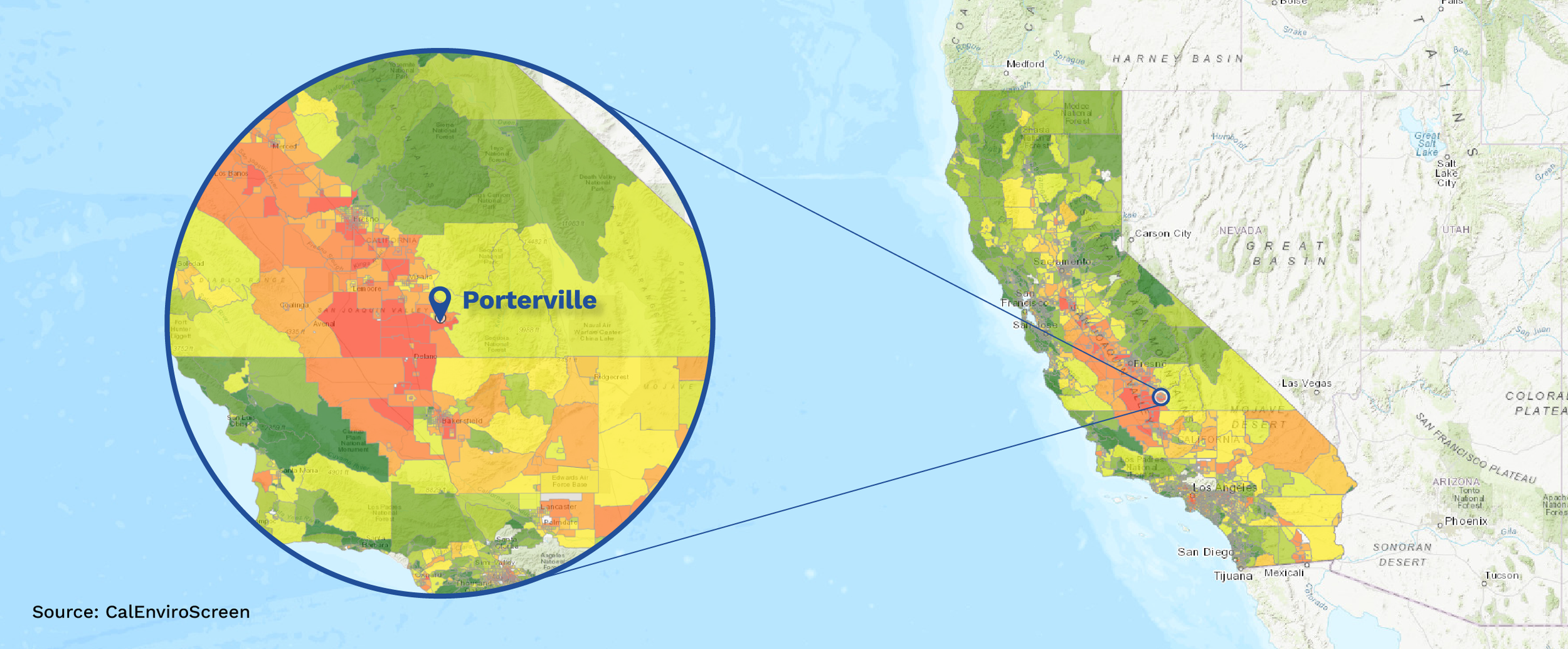OUR WORK WITH SCHOOLS
Climate Action Pathways for Schools (CAPS) works across the state of California to advance inspiring climate education programs and implement projects to lower greenhouse gas emissions.
Current School District Partners
Continue reading to learn more about our projects, process, and results with our most established program at Porterville Unified School District.
CASE STUDY: PORTERVILLE PILOT PROGRAM
Explore CAPS work in action through our pilot program with Porterville Unified School District (PUSD).
In 2019, Porterville Unified School District (PUSD) partnered with CAPS to launch our pilot program and create a ten year climate action roadmap to reduce greenhouse gas emissions while saving money for the district. PUSD was selected to pilot our energy and sustainability program because of its supportive leadership team, track record of innovating in both clean energy and education, and need for climate programming that supports students to lead initiatives that make a tangible impact on climate change in their community.
Porterville is disproportionately burdened by multiple sources of pollution and has population characteristics that make it more vulnerable to pollution. Through empowering students and educational leadership to take meaningful action around climate change and improve their school’s environmental impact, school districts like PUSD can lead the transition to a healthier and more sustainable future. This work also provides on-the-ground paid experience for students, helping them become part of the critical future workforce in the lucrative green tech industry.
OVERVIEW
RESULTS AT PORTERVILLE
COST SAVINGS
We exceeded our goal, achieving $850,000 in electric and natural gas savings in the first two years, a 25% cost reduction.
GRANT SUPPORT
CAPS helped PUSD raise $9.3M in state grants to support work-based learning and implement projects related to the district’s climate action plan.
REDUCED GHG EMISSIONS
Our goal is to reduce GHG emissions by 80% by 2030. In the first two years, we have reduced GHG emissions by 28%.
EXCEPTIONAL STUDENT OUTCOMES
Paid internships build professional and technical skills, like learning how to collect, manage, and analyze large quantities of data and presenting findings to key stakeholders.
BACKGROUND
The Porterville district is impacted by the effects of climate change. Porterville scores high on the CalEnviroScreen, which analyzes potential exposures to pollutants, adverse environmental conditions, socioeconomic factors, and the prevalence of certain health conditions.
As the effects of climate change worsen, existing public health, economic, and educational inequities are compounded. Mitigating the impacts of climate change is an essential step toward reducing the systemic inequalities in the United States. Through the CAPS program, school districts can play a critical role in immediately addressing environmental impacts in their communities while also providing real-life training in and exposure to green careers, helping to build the next generation of climate leadership.
PORTERVILLE AT A GLANCE
School District
Serve over 14,000 students in K-12
83% of students are eligible for free or reduced meals
22 school sites (grade range K–12)
Annual energy costs of buildings: $1,805,000
Community Demographics
Porterville, California
Population: 62,623
Rural, agricultural community
88.9% socioeconomically disadvantaged
83% Hispanic and 25% English Learners
Top 3% in CA for fine particulate matter and top 18% in CA for ground-level ozone
Students are involved in every aspect of the program — including developing communications tools to describe their efforts to mitigate climate change. Check out the video below created by Porterville students.
The Energy & Sustainability Program
CAPS works with each school district to create a climate action roadmap that is tailored to each district’s individual needs, goals, and resources. We call this program The Energy and Sustainability Program.
A cornerstone of this program is our paid, work-based learning initiative for high school students. CAPS hires student interns to develop and support climate mitigation projects within their district, preparing them for highly skilled college and career pathways.
“I plan to study architecture and civil engineering in college, and I hope to combine energy conservation and efficiency into building and designing more environmentally friendly buildings. I’ll always have that green consideration now because I am aware of how large of an impact it can have.”
~ Student participant
Throughout the year, interns at Porterville
Manage a districtwide energy conservation competition
Track and analyze energy use and cost data at all sites, including solar optimization monitoring
Assist in ASHRAE Level 1 energy audits
Reduce GHG emissions associated with student commutes, including electrification of the bus fleet and active transportation planning
Develop and hone leadership, teamwork, technical, and professional skills
APPROACH: The First Three Years
At PUSD, the first three years of the program have focused on:
-
The student interns start by setting an energy savings target for every school in their district and then tracking each school’s monthly energy usage relative to the savings target, looking for inefficiencies. This process is repeated each month throughout the school year.
Interns also develop conservation strategies to be used by school faculty across the district. For example, they determined the ideal lighting level for classrooms using light meters. This encouraged teachers to switch off up to two-thirds of classroom lighting fixtures while still achieving the appropriate lighting levels.
The interns are currently working with a professional engineering firm to complete an ASHRAE Level 1 energy audit for the district, which will provide an in-depth look at PUSD’s energy efficiency profile. They will use the audit findings to develop a heating, ventilation, and air conditioning transition plan to prioritize updates for optimal savings and carbon neutrality.
-
The interns have created a daily monitoring system to optimize the solar systems’ electricity output. They created an automation tool in Excel to set off an alarm when a solar system is underperforming or not operating, which limits most solar array downtimes to 24 hours or less. This system has increased the PUSD solar performance to 93% for the 2020–21 year (up from 83% the prior year). This 10% increase in production accounted for a reduction in PUSD’s electric bills by over $125,000.
-
CAPS aims to provide every PUSD student the opportunity to commute to and from school with zero pollution and zero-GHG emissions by 2030. Interns are currently working on a final zero-emissions transportation plan for the district with these key elements:
Electric Bus Fleet: CAPS is supporting PUSD in developing a plan to convert their thirty-nine diesel buses to an entirely zero-emission electric bus fleet. This will eliminate GHG emissions and reduce thousands of students’ exposure to diesel pollutants.
Active Transportation: Research links walking or biking to school with improved health and academic performance. CAPS is working with Safe Routes to Schools and the City to expand active transportation routes around Porterville.
Public Transportation: We are collaborating with the city to expand a free or low-cost ‘Student Pass’ program so that all PUSD students can access and use their zero-emission electric vehicle public transportation fleet.
CAPS works with various companies to provide hands-on learning opportunities for our students. Learn more about our partnership program and ways your company can get involved on our partnerships page.
Interested in learning more about how CAPS can support your districts’ goals?





